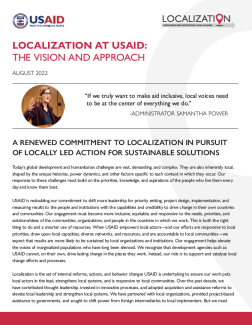Today’s global development and humanitarian challenges are vast, demanding, and complex. They are also inherently local, shaped by the unique histories, power dynamics, and other factors specific to each context in which they occur. Our responses to these challenges must build on the priorities, knowledge, and aspirations of the people who live them every day and know them best.
USAID is redoubling our commitment to shift more leadership for priority setting, project design, implementation, and measuring results to the people and institutions with the capabilities and credibility to drive change in their own countries and communities. Our engagement must become more inclusive, equitable, and responsive to the needs, priorities, and solutions/ideas of the communities, organizations, and people in the countries in which we work. This is both the right thing to do and a smarter use of resources. When USAID empowers local actors—and our efforts are responsive to local priorities, draw upon local capacities, diverse networks, and resources, and are accountable to local communities—we expect that results are more likely to be sustained by local organizations and institutions. Our engagement helps elevate the voices of marginalized populations who have long been silenced. We recognize that development agencies such as USAID cannot, on their own, drive lasting change in the places they work. Instead, our role is to support and catalyze local change efforts and processes.
Localization is the set of internal reforms, actions, and behavior changes USAID is undertaking to ensure our work puts local actors in the lead, strengthens local systems, and is responsive to local communities. Over the past decade, we have contributed thought leadership, invested in innovative processes, and adopted acquisition and assistance reforms to elevate local leadership and strengthen local systems. We have partnered with local organizations, provided project-based assistance to governments, and sought to shift power from foreign intermediaries to local implementers. But we must further expand and enhance these efforts, embracing localization throughout our development and humanitarian assistance work and centering our organizational culture around localization objectives. Localization is more than directing awards to local organizations. Instead, it requires us to shift how we perceive local actors, valuing their knowledge, respecting their expertise, championing their agency, recognizing their commitment and integrity, and engaging them as partners rather than as our agents and beneficiaries. This kind of partnership will require us to emphasize trust-building, mutuality, and long-term commitments to a shared vision.

